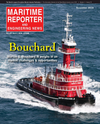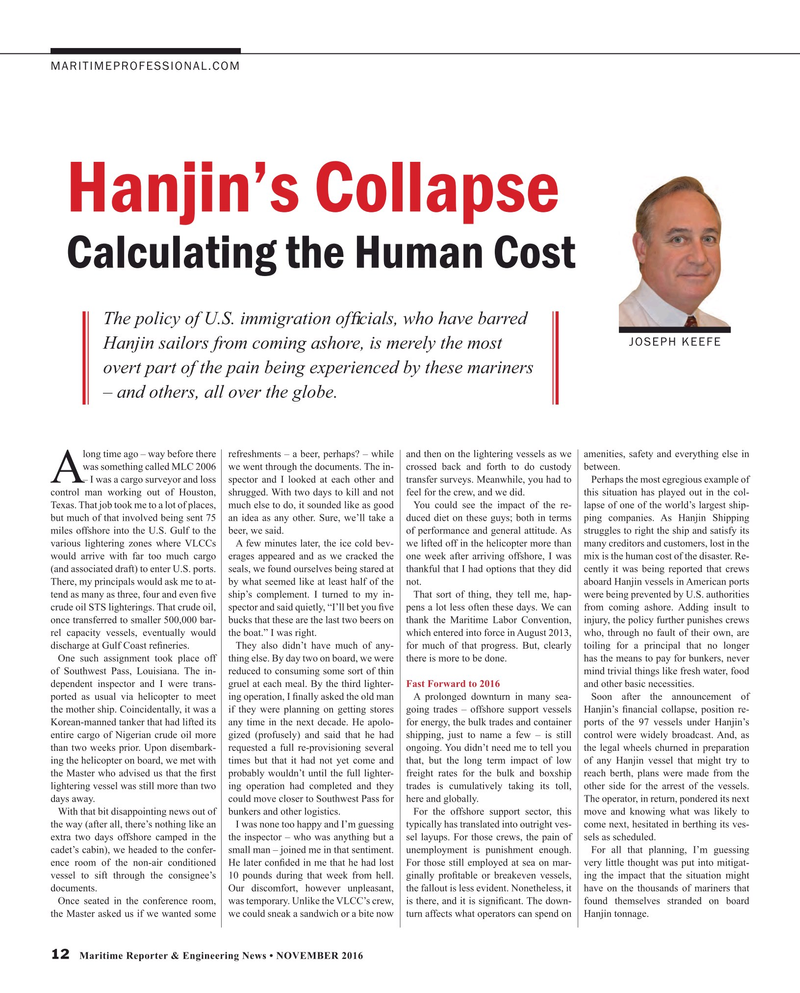
Page 12: of Maritime Reporter Magazine (November 2016)
Workboat Edition
Read this page in Pdf, Flash or Html5 edition of November 2016 Maritime Reporter Magazine
MARITIMEPROFESSIONAL.COM 27,000+ Members: Join the largest networking group in the maritime industry
Hanjin’s Collapse
Calculating the Human Cost
The policy of U.S. immigration of? cials, who have barred
JOSEPH KEEFE
Hanjin sailors from coming ashore, is merely the most overt part of the pain being experienced by these mariners – and others, all over the globe.
long time ago – way before there refreshments – a beer, perhaps? – while and then on the lightering vessels as we amenities, safety and everything else in was something called MLC 2006 we went through the documents. The in- crossed back and forth to do custody between.
A – I was a cargo surveyor and loss spector and I looked at each other and transfer surveys. Meanwhile, you had to Perhaps the most egregious example of control man working out of Houston, shrugged. With two days to kill and not feel for the crew, and we did. this situation has played out in the col-
Texas. That job took me to a lot of places, much else to do, it sounded like as good You could see the impact of the re- lapse of one of the world’s largest ship- but much of that involved being sent 75 an idea as any other. Sure, we’ll take a duced diet on these guys; both in terms ping companies. As Hanjin Shipping miles offshore into the U.S. Gulf to the beer, we said. of performance and general attitude. As struggles to right the ship and satisfy its various lightering zones where VLCCs A few minutes later, the ice cold bev- we lifted off in the helicopter more than many creditors and customers, lost in the would arrive with far too much cargo erages appeared and as we cracked the one week after arriving offshore, I was mix is the human cost of the disaster. Re- (and associated draft) to enter U.S. ports. seals, we found ourselves being stared at thankful that I had options that they did cently it was being reported that crews
There, my principals would ask me to at- by what seemed like at least half of the not. aboard Hanjin vessels in American ports tend as many as three, four and even ? ve ship’s complement. I turned to my in- That sort of thing, they tell me, hap- were being prevented by U.S. authorities crude oil STS lighterings. That crude oil, spector and said quietly, “I’ll bet you ? ve pens a lot less often these days. We can from coming ashore. Adding insult to once transferred to smaller 500,000 bar- bucks that these are the last two beers on thank the Maritime Labor Convention, injury, the policy further punishes crews rel capacity vessels, eventually would the boat.” I was right. which entered into force in August 2013, who, through no fault of their own, are discharge at Gulf Coast re? neries. They also didn’t have much of any- for much of that progress. But, clearly toiling for a principal that no longer
One such assignment took place off thing else. By day two on board, we were there is more to be done. has the means to pay for bunkers, never of Southwest Pass, Louisiana. The in- reduced to consuming some sort of thin mind trivial things like fresh water, food dependent inspector and I were trans- gruel at each meal. By the third lighter- Fast Forward to 2016 and other basic necessities.
ported as usual via helicopter to meet ing operation, I ? nally asked the old man A prolonged downturn in many sea- Soon after the announcement of the mother ship. Coincidentally, it was a if they were planning on getting stores going trades – offshore support vessels Hanjin’s ? nancial collapse, position re-
Korean-manned tanker that had lifted its any time in the next decade. He apolo- for energy, the bulk trades and container ports of the 97 vessels under Hanjin’s entire cargo of Nigerian crude oil more gized (profusely) and said that he had shipping, just to name a few – is still control were widely broadcast. And, as than two weeks prior. Upon disembark- requested a full re-provisioning several ongoing. You didn’t need me to tell you the legal wheels churned in preparation ing the helicopter on board, we met with times but that it had not yet come and that, but the long term impact of low of any Hanjin vessel that might try to the Master who advised us that the ? rst probably wouldn’t until the full lighter- freight rates for the bulk and boxship reach berth, plans were made from the lightering vessel was still more than two ing operation had completed and they trades is cumulatively taking its toll, other side for the arrest of the vessels. days away. could move closer to Southwest Pass for here and globally. The operator, in return, pondered its next
With that bit disappointing news out of bunkers and other logistics. For the offshore support sector, this move and knowing what was likely to the way (after all, there’s nothing like an I was none too happy and I’m guessing typically has translated into outright ves- come next, hesitated in berthing its ves- extra two days offshore camped in the the inspector – who was anything but a sel layups. For those crews, the pain of sels as scheduled. cadet’s cabin), we headed to the confer- small man – joined me in that sentiment. unemployment is punishment enough. For all that planning, I’m guessing ence room of the non-air conditioned He later con? ded in me that he had lost For those still employed at sea on mar- very little thought was put into mitigat- vessel to sift through the consignee’s 10 pounds during that week from hell. ginally pro? table or breakeven vessels, ing the impact that the situation might documents. Our discomfort, however unpleasant, the fallout is less evident. Nonetheless, it have on the thousands of mariners that
Once seated in the conference room, was temporary. Unlike the VLCC’s crew, is there, and it is signi? cant. The down- found themselves stranded on board the Master asked us if we wanted some we could sneak a sandwich or a bite now turn affects what operators can spend on Hanjin tonnage. 12 Maritime Reporter & Engineering News • NOVEMBER 2016
MR #11 (10-17).indd 12 11/3/2016 4:26:41 PM

 11
11

 13
13
